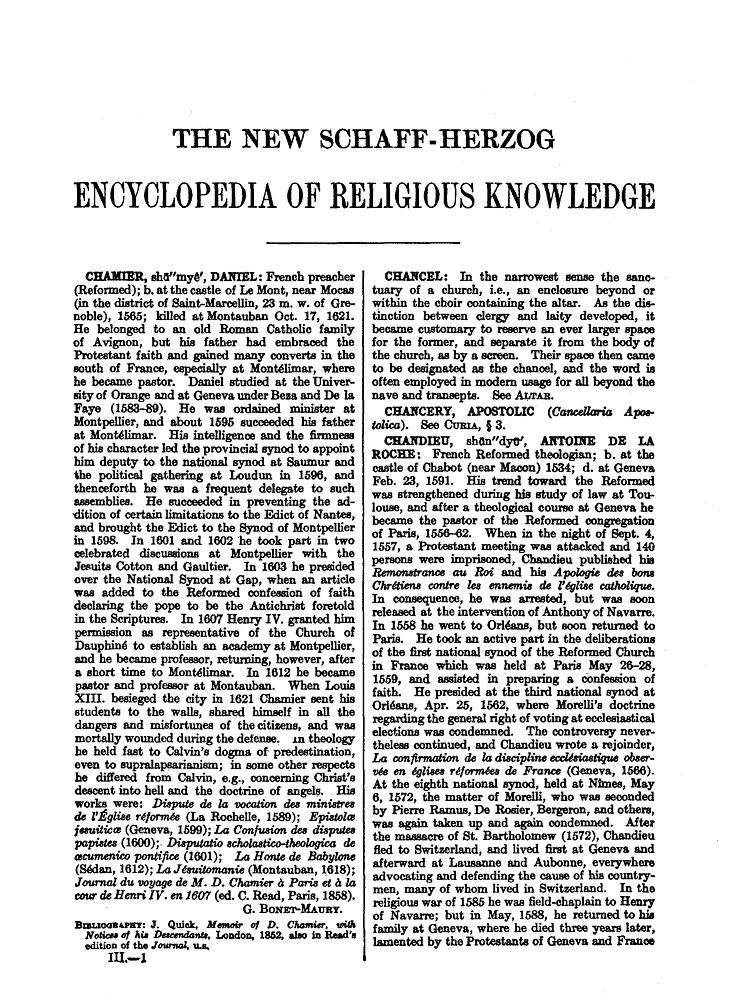


CHANCEL: In the narrowest sense the sanctuary of a church, i.e., an enclosure beyond or within the choir containing the altar. As the distinction between clergy and laity developed, it became customary to reserve an ever larger space for the former, and separate it from the body of the church, as by a screen. Their space then came to be designated as the chancel, and the word is often employed in modern usage for all beyond the nave and transepts. See ALTAR.
CHANCERY, APOSTOLIC (Cancellaria Apostolica). See CURIA, § 3.
CHANDIEU, shan"dyu', ANTOINE DE LA ROCHE: French Reformed theologian; b. at the castle of Chabot (near Macon) 1534; d. at Geneva Feb. 23, 1591. His trend toward the Reformed was strengthened during his study of law at Toulouse, and after a theological course at Geneva he became the pastor of the Reformed congregation of Paris, 1556-62. When in the night of Sept. 4, 1557, a Protestant meeting was attacked and 140 persons were imprisoned, Chandieu published his Remonstrance au Roi and his Apologie des bons Chretiens contre les ennemis de l'eglise catholique. In consequence, he was arrested, but was soon released at the intervention of Anthony of Navarre. In 1558 he went to Orleans, but soon returned to Paris. He took an active part in the deliberations of the first national synod of the Reformed Church in France which was held at Paris May 26-28, 1559, and assisted in preparing a confession of faith. He presided at the third national synod at Orleans, Apr. 25, 1562, where Morelli's doctrine regarding the general right of voting at ecclesiastical elections was condemned. The controversy nevertheless continued, and Chandieu wrote a rejoinder, La confirmation de la discipline ecclesiastique observee en eglises reformees de France (Geneva, 1566). At the eighth national synod, held at Nimes, May 6, 1572, the matter of Morelli, who was seconded by Pierre Ramus, De Rosier, Bergeron, and others, was again taken up and again condemned. After the massacre of St. Bartholomew (1572), Chandieu fled to Switzerland, and lived first at Geneva and afterward at Lausanne and Aubonne, everywhere advocating and defending the cause of his countrymen, many of whom lived in Switzerland. In the religious war of 1585 he was field-chaplain to Henry of Navarre; but in May, 1588, he returned to his family at Geneva, where he died three years later, lamented by the Protestants of Geneva and France

|
2 |
BIBLIOGRAPHY: A. Bernus, Le Ministre A. de Chandieu, in Bulletin de la societe de l'histoire du protestantisme francais, xxxvii (1888), 2 sqq; J. Senebier, Histoire litteraire de Geneve, i. 322 sqq., Geneva, 1786; E. and E. Haag, La France protestante, ed. H. L. Bordier, iii. 1049 sqq., Paris, 1852, Lichtenberger, ESR, iii. 33-41, Paris, 1878.
Calvin College. Last modified on 10/03/03. Contact the CCEL. |  |